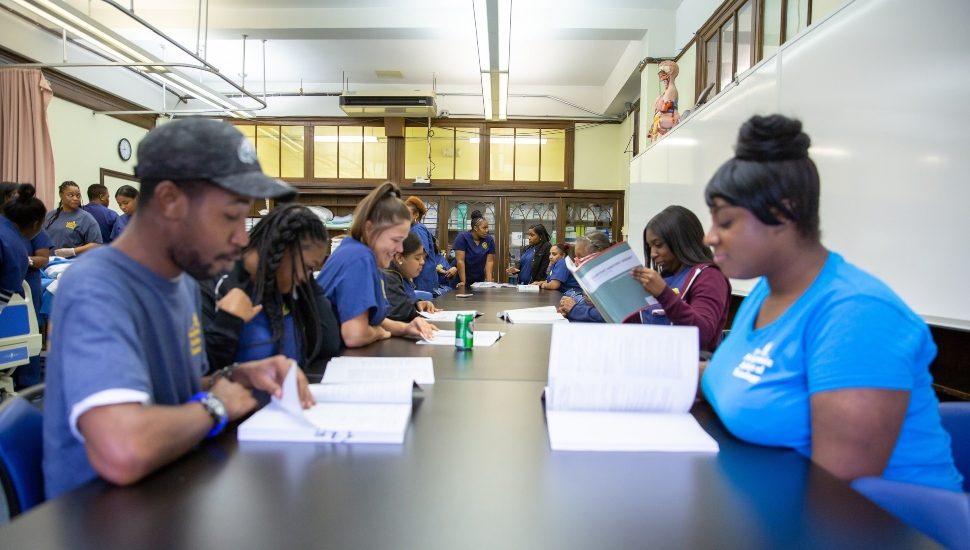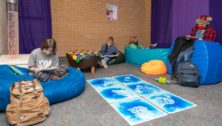From P.I.T.: Top 10 tips on how to study smarter, not longer


The Spring Term is now underway at the Pennsylvania Institute of Technology in Media. To help students with their course work, P.I.T. presents this post from Kathiann Kowalski at sciencenewsforstudents.org on the study habits that work best.
1. Space out your studying
Nate Kornell “definitely did cram” before big tests when he was a student and it’s a good idea to study the day before a big test. But research shows it’s a bad idea to cram all your studying into that day. Instead, space out those study sessions.
Kornell compares our memory to water in a bucket that has a small leak. Try to refill the bucket while it’s still full, and you can’t add much more water.
Allow time between study sessions, and some of the material may drip out of your memory. But then you’ll be able to relearn it and learn more in your next study session. And you’ll remember it better, next time, he notes.
2. Practice, practice, practice!
Musicians practice their instruments. Athletes practice sports skills. The same should go for learning.
“If you want to be able to remember information, the best thing you can do is practice,” says Katherine Rawson. She’s a psychologist at Kent State University in Ohio.
3. Don’t just reread books and notes
As a teen, Cynthia Nebel studied by reading her textbooks, worksheets and notebooks. “Over and over and over again,” recalls this psychologist at Vanderbilt University in Nashville, Tenn. Now, she adds, “we know that’s one of the most common bad study skills that students have.”
Too often, when students reread material, it’s superficial, says McDaniel, who also co-wrote the 2014 book, Make It Stick: The Science of Successful Learning. Rereading is like looking at the answer to a puzzle, rather than doing it yourself, he says. It looks like it makes sense. But until you try it yourself, you don’t really know if you understand it.
4. Test yourself
Retrieval practice is one of the best ways you can study. Nebel said her mom quizzed her on the material before a big test. As Nebel got older, she quizzed herself. For example, she might cover up the definitions in her notebook. Then she tried to recall what each term meant.
“Try to quiz yourself the way the teacher asks questions,” Nebel adds.
You can create a deck of flashcards every time you learn new information, Put the questions on one side and the answers on the other.
It’s also important to dig down beyond just the answer, to really understand the material.
Teachers often dig deeper. They don’t just ask for definitions. Often, teachers ask students to compare and contrast ideas. That takes some critical thinking.
5. Mistakes are okay — as long as you learn from them
It’s crucial to test your memory. It doesn’t really matter how many seconds you spend on each try. But it’s important to go to the next step. Check to see if you were right. Then focus on what you got wrong.
A secret of science: Mistakes boost understanding
In fact, making mistakes can be a good thing, argues Stuart Firestein. A Columbia University biologist in New York City, he actually wrote the book on it. It’s called Failure: Why Science is So Successful. Mistakes, he argues, are actually a primary key to learning.
6. Mix it up
In many cases, it helps to mix up your self-testing. Don’t just focus on one thing. Drill yourself on different concepts. Psychologists call this interleaving.
Actually, your tests usually will have questions mixed up, too. More importantly, interleaving can help you learn better. If you practice one concept over and over your attention decreases because you know what’s coming up next.
Mix up your practice, and you now space the concepts apart. You can also see how concepts differ, form trends or fit together in some other way.
Interleaving can help students with both strong and weak working memory. Working memory lets you remember where you are in an activity, such as following a recipe.
7. Use pictures
Pay attention to diagrams and graphs in your class materials. They can boost your memory. If there aren’t pictures, creating them can be useful.
8. Find examples
Abstract concepts can be hard to understand. It tends to be far easier to form a mental image if you have a concrete example of something, Nebel says.
For instance, sour foods usually taste that way because they contain an acid. On its own, that concept might be hard to remember. But if you think about a lemon or vinegar, it’s easier to understand and remember that acids and sour go together. And the examples might help you to identify other foods’ taste as being due to acids.
Indeed, it helps to have at least two examples if you want to apply information to new situations. Nebel and others reviewed studies on this in July 2019. Their Journal of Food Science Education report describes how students can improve their study skills.
9. Dig deeper
It’s hard to remember a string of facts and figures if you don’t push further. Ask why things are a certain way. How did they come about? Why do they matter? Psychologists call this elaboration. It’s taking class material and “asking a lot of how and why questions about it,” Nebel says. In other words, don’t just accept facts at face value.
Elaboration helps you combine new information with other things you know. And it creates a bigger network in your brain of things that relate to one another, she says. That larger network makes it easier to learn and remember things.
10. Make a plan — and stick to it
Many students know they should space out study periods, quiz themselves and practice other good skills. Yet many don’t actually do those things. Often, they fail to plan ahead.
Back when Rawson was a student, she used a paper calendar for her planning. She wrote in the date for each exam. “And then for four or five other days,” she recalls, “I wrote in time to study.”
Try to stick to a routine, too. Have a set time and place where you do schoolwork and studying. And put your phone somewhere else while you work, adds Nebel.
Allow yourself short breaks. Set a timer for 25 minutes or so. Study during that time, with no distractions. When the timer goes off, take a five or 10-minute break. Exercise. Check your phone. Maybe drink some water — whatever. Afterward, set the timer again.
Bonus: Be kind to yourself
Try to stick to a regular routine. And get enough sleep — not just the night before the test but for weeks or months on end. “Those things are really, really important for learning,” Nebel says. Exercise helps as well, she says.
Don’t stress out if all of this seems like a lot, she adds. If a lot seems new, try adding just one new study skill each week or two. Or at least space out your study sessions and practice retrieval for the first few months. As you get more practice, you can add more skills. And if you need help, ask.
Finally, if you struggle to follow the advice above (such as you can’t keep track of time or find it very hard to just sit and focus on your work), you may have an undiagnosed condition, such as ADHD. To find out, check with your doctor. The good news: It may be treatable.
Read the complete blog post here.
About the Pennsylvania Institute of Technology
The Pennsylvania Institute of Technology is a private non-profit college offering an education for career development and advancement, college transfer opportunities, and personal growth.
Students enrolled at P.I.T. have access to two-year associate degrees, two one-year career certificate courses and two Bachelor’s degree programs.
Find out more about the Pennsylvania Institute of Technology.
Join Our Community
Never miss a Delaware County story!
"*" indicates required fields





















![95000-1023_ACJ_BannerAd[1]](https://delco.today/wp-content/uploads/sites/3/2023/03/95000-1023_ACJ_BannerAd1.jpg)









